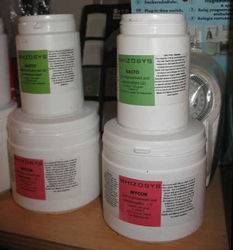SativaBelieva
Active member
Thinking ferts are somewhat generic... yet I have some cutting edge, bio, soil life, additives that you can buy from outside the canna-business world... these soil organisms live everywhere in nature... abundantly... but they don't get time to colonize in sterile cannabis grow operations... in the Netherlands soil gets sterilized before it is allowed to be sold... to kill all fungi and bacteries... the bad as well as the good... so I add symbiotic fungi and bacteries of my choice to my fresh soil...
To start I add mycorrhizal fungi when transplanting the clones into big soil containers. These fungi are considered by plant scientists to be the biological cornerstone of plant life on earth.... and every 2 weeks I add beneficial bacteria to the water... These help make essential soil mineral elements, available to the plant; and help decompose organic matter and improve physical properties of the soil.
I got these products from my friend... his nick name is Sannie... and he is active on several cannabis forums showing off his excellent Jack Herer... real big buds... 12 weeks sativa pheno... he gets his gear from an american producer that doesn't want to be associated with cannabis... so you have to do your own research if you want this stuff... anyway, I am a believer... and next to top class genetics, this is the only ingredient helping me to differentiate from the masses...
info on nutes I use...
Canna Terra Flores - the BIO version is my basic component... all organic... don't see it on their website... I used to add Cannazym...
http://www.canna.com/site/dhtml/pro...es_cannazym.php
Now I've replaced Cannazym by Liquid Karma from American Agritech/Botanicare...
http://www.americanagritech.com/pro...=1&pro_id_pk=30
In the second half of the flowering phase, it gets more interesting... instead of chemical or mineral PK13-14, I add only organic nutrients... no residu build up in my medium!
Organic P: Guanokalong thea (still using the pack I got from Soma in 2005, he said he could taste the PK13-14 and offered my this alternative)...
http://www.guanokalong.nl/
Organic K: Vitrasol from BioNova... sweetens the buds...
http://www.bionova.nl/SiteEN/En/pag...il3EN.asp?ID=58
Curious for the experience of all you organic soil growers...
SB
Edit: as some have asked me for info on the soil I use... just for a complete view... medium, nutes and beneficial organisms...
Most used soil for cannabis in the Netherlands... AllMix from BioBizz...
http://www.biobizz.nl/menutekst.asp?MenuID=,425,430&ID=430
Currently I'm trying BatMix from Plagron... on the bottom... on the top half I still use AllMix...
http://www.plagron.nl/2005/Plagron_UK/UK_web/pages/batmix.shtml
To start I add mycorrhizal fungi when transplanting the clones into big soil containers. These fungi are considered by plant scientists to be the biological cornerstone of plant life on earth.... and every 2 weeks I add beneficial bacteria to the water... These help make essential soil mineral elements, available to the plant; and help decompose organic matter and improve physical properties of the soil.
I got these products from my friend... his nick name is Sannie... and he is active on several cannabis forums showing off his excellent Jack Herer... real big buds... 12 weeks sativa pheno... he gets his gear from an american producer that doesn't want to be associated with cannabis... so you have to do your own research if you want this stuff... anyway, I am a believer... and next to top class genetics, this is the only ingredient helping me to differentiate from the masses...
info on nutes I use...
Canna Terra Flores - the BIO version is my basic component... all organic... don't see it on their website... I used to add Cannazym...
http://www.canna.com/site/dhtml/pro...es_cannazym.php
Now I've replaced Cannazym by Liquid Karma from American Agritech/Botanicare...
http://www.americanagritech.com/pro...=1&pro_id_pk=30
In the second half of the flowering phase, it gets more interesting... instead of chemical or mineral PK13-14, I add only organic nutrients... no residu build up in my medium!
Organic P: Guanokalong thea (still using the pack I got from Soma in 2005, he said he could taste the PK13-14 and offered my this alternative)...
http://www.guanokalong.nl/
Organic K: Vitrasol from BioNova... sweetens the buds...
http://www.bionova.nl/SiteEN/En/pag...il3EN.asp?ID=58
Curious for the experience of all you organic soil growers...
SB
Edit: as some have asked me for info on the soil I use... just for a complete view... medium, nutes and beneficial organisms...
Most used soil for cannabis in the Netherlands... AllMix from BioBizz...
http://www.biobizz.nl/menutekst.asp?MenuID=,425,430&ID=430
Currently I'm trying BatMix from Plagron... on the bottom... on the top half I still use AllMix...
http://www.plagron.nl/2005/Plagron_UK/UK_web/pages/batmix.shtml
Last edited:




